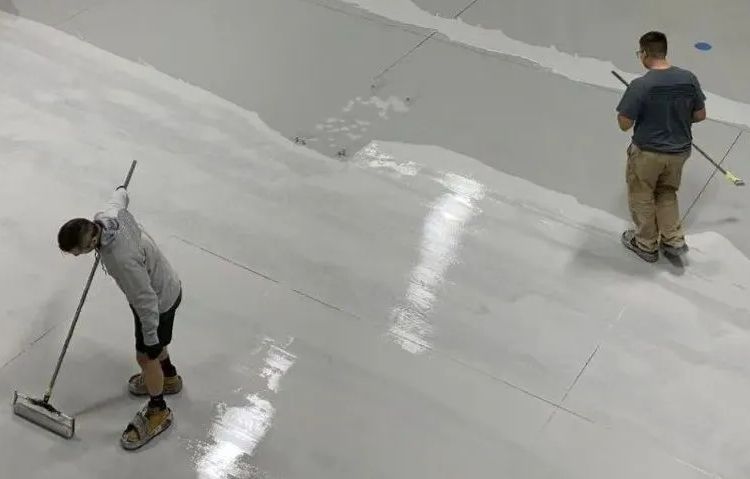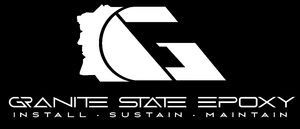Aviation Epoxy Flooring in Manchester, NH: Superior Solutions for Aircraft Facilities
In aviation, the floor is more than just a surface — it’s part of the infrastructure that keeps operations running safely and efficiently. At our Manchester, NH facility, we install aviation‑grade epoxy systems designed to meet the unique demands of hangars, maintenance bays, and other aircraft environments. These floors are built to handle the weight of heavy equipment, resist damage from chemical spills, and maintain a clean, professional appearance under constant use.
Our systems are engineered for strength, with compressive ratings over 10,000 PSI, complete resistance to aviation fluids, and a seamless finish that leaves no place for debris to collect. The result is a surface that’s tough enough for high‑performance operations yet easy to maintain day‑to‑day.
Because safety is non‑negotiable in this industry, we integrate features like
slip‑resistant textures, high‑visibility line markings, and color‑coded zones. These details not only help protect crews and equipment but also reinforce the precision and professionalism that define aviation facilities.
Core Benefits and Performance of Aviation Epoxy Flooring in Manchester, NH
Aviation‑grade epoxy flooring offers the strength, chemical resistance, and safety features that aircraft facilities depend on. Our specialized coatings provide a solid, long‑lasting foundation designed to handle the heavy loads, fluid exposure, and constant activity of hangars, maintenance bays, and support areas.
Engineered Strength and Load-Bearing Capacity
Our aviation epoxy floors withstand extreme mechanical stress with compressive strength ratings exceeding 10,000 PSI. This superior strength ensures protection against heavy aircraft, maintenance equipment, and rolling loads.
The coating's high tensile strength prevents cracking and delamination under point loads from jacks and lifts.
We engineer these floors specifically to resist tire marks and indentation from tugs, tow tractors, and other ground support equipment.
Chemical and Fluid Resistance for Aviation Environments
Our epoxy coating systems provide superior protection against harsh aviation chemicals and fluids. The non-porous surface resists penetration from Jet-A fuel, Avgas, and hydraulic fluids.
The chemical-resistant formulation withstands:
- Aviation fuels and oils
- Skydrol and brake fluids
- Deicing chemicals
- Industrial cleaners and solvents
Regular exposure to corrosive substances won't compromise the coating's integrity or performance.
Slip Resistance and Safety Enhancement
Our aviation epoxy floors are finished with a textured surface that provides steady footing in both wet and dry conditions. The level of slip resistance is adjusted to match the exact needs of each facility, whether it’s a busy hangar or a maintenance bay.
Safety features include:
- Anti‑slip aggregates placed in high‑traffic walkways
- Bright, durable line markings to clearly define work zones
- Color‑coded sections for different operational areas
- Reflective finishes that improve visibility in low‑light conditions
These features are designed to keep working areas safe and functional, even when exposed to oils, aviation fluids, or other challenging substances common in aircraft environments.

Seamless and Hygienic Surface Design
Our epoxy flooring creates a continuous, joint-free surface that eliminates places for debris and contaminants to collect. This seamless design is crucial for maintaining clean aviation environments.
The non-porous finish prevents bacterial growth and makes cleaning efficient. Spills and stains can be quickly removed with standard cleaning methods.
We install the system to create smooth transitions between floor sections, eliminating trip hazards and reducing FOD risks.
Specialized Types and Customization Options for Aviation Epoxy Flooring
Aircraft facilities demand flooring solutions designed around their specific operational needs and strict safety standards. We offer a range of epoxy systems, each with distinct performance benefits and visual styles, allowing us to match the right product to the function and appearance requirements of every space.
Coating Solutions for Different Aviation Applications
Every area within an aviation facility has its own set of demands, so we select coating systems that are purpose‑built for each space.
Maintenance Areas:
- Epoxy blends formulated for strong chemical resistance
- Added texture for improved slip resistance
- Protection against oil, fuel, and other aviation fluids
Terminal Areas:
- Decorative flake finishes for a polished, welcoming look
- Heavy‑duty wear layers to handle constant foot traffic
- Static‑dissipative options to safeguard sensitive equipment
Hangar Floors:
- Ultra‑high‑build coatings for maximum durability
- Impact‑resistant formulas to withstand heavy loads and dropped tools
- Custom line striping and safety markings for clear, organized work zones
Resin Flooring Systems for Hangars and Terminals
In busy aviation spaces like hangars and passenger terminals, the floor takes a beating every single day. Our resin systems are built to handle it — resisting chemical spills, heavy impacts, and constant traffic without losing their finish. Depending on the needs of the space, we install systems between 60 and 120 mils thick, giving them the strength to perform for years.
Key features:
- Self‑leveling blends that create a smooth, even surface from wall to wall
- UV‑stable options that keep their color and gloss under direct sunlight
- Fast‑curing formulas to get operations back on schedule quickly
- Flexible systems that move with the substrate to help prevent cracking
For added safety, we can work in non‑slip textures where needed and use reflective elements to improve visibility in dimly lit areas. These details make a real difference in keeping crews safe and operations running smoothly.
Metallic Epoxy Flooring for Unique Aesthetics
Metallic epoxy floors combine durability with striking visual appeal for aviation facility lobbies and showrooms. The metallic pigments create depth and movement while maintaining the same strength as traditional epoxy systems.
These floors feature a 3D appearance that masks minor imperfections and reduces visible wear patterns. The metallic finish reflects light effectively, brightening interior spaces.
We offer metallic epoxy in various color combinations, from subtle earth tones to bold metallic effects that complement aircraft displays and modern aviation aesthetics.
Frequently Asked Questions
Aviation‑grade epoxy flooring is built to handle the tough conditions found in aircraft facilities. It offers excellent resistance to chemicals, outstanding durability, and integrated safety features that support day‑to‑day operations. With proper installation and a consistent maintenance routine, these floors provide a long‑lasting surface that helps protect both the aircraft and the crews who work around them.
What are the main advantages of using epoxy flooring in aircraft hangars?
Epoxy flooring is engineered to meet the heavy‑duty demands of aircraft storage and maintenance areas. It offers outstanding impact resistance and the load‑bearing strength needed to support planes, equipment, and vehicles without cracking or surface damage.
The seamless design leaves no joints or crevices where dirt, dust, or debris can build up, making it easier to maintain strict cleaning and safety protocols. Aviation‑grade epoxy also provides full protection against harsh chemicals — from jet fuel to hydraulic fluids — while maintaining a clean, professional appearance.
Available in both high‑gloss finishes that brighten the space and matte options that reduce glare, these floors deliver the durability and performance hangars require, with a finish that complements the overall look of the facility.
How does aviation epoxy flooring ensure safety and compliance with FAA and OSHA standards?
We incorporate anti-slip aggregates and textured finishes to meet slip coefficient requirements for workplace safety regulations.
Our epoxy systems feature clear line markings and safety zones that remain visible even under heavy traffic conditions.
The non-sparking properties of epoxy flooring align with fire safety requirements in fuel-handling areas.
What is involved in the maintenance and upkeep of epoxy flooring in aviation environments?
Daily maintenance requires simple sweeping and occasional damp mopping to remove dust and debris.
Chemical spills should be cleaned promptly using approved aviation cleaning products.
We recommend quarterly deep cleaning and annual inspections to maintain optimal performance.
Can aviation epoxy floors withstand heavy-duty operations such as aircraft landings and rolling traffic?
Our epoxy systems handle point loads exceeding 10,000 PSI from aircraft landing gear and maintenance equipment.
The reinforced surface resists indentation from jack stands and heavy tool impacts.
What is the typical lifespan of an aviation epoxy floor system under regular operational conditions?
Professional-grade aviation epoxy floors typically last 15-20 years with proper maintenance.
High-traffic areas may require recoating every 7-10 years to maintain optimal performance.
How are chemical-resistant epoxy coatings beneficial in aircraft maintenance areas?
The specialized coating resists degradation from jet fuel, hydraulic fluids, and harsh cleaning agents.
Quick spill cleanup prevents chemical absorption and substrate damage.
These systems maintain their protective properties even under repeated exposure to aviation fluids and solvents.
Request a Free Consultation Today
Your aviation facility deserves a floor that works as hard as you do. Whether you’re storing private jets, maintaining commercial fleets, or managing critical air support systems, we install epoxy flooring in Sunapee, NH that delivers unmatched performance, safety, and visual appeal.
📞
Call now or
fill out our contact form to schedule a free on-site consultation.
📍 Serving hangars, airports, and aviation hubs across New Hampshire.
Upgrade your aviation facility with flooring built for flight—engineered to endure, designed to perform.

